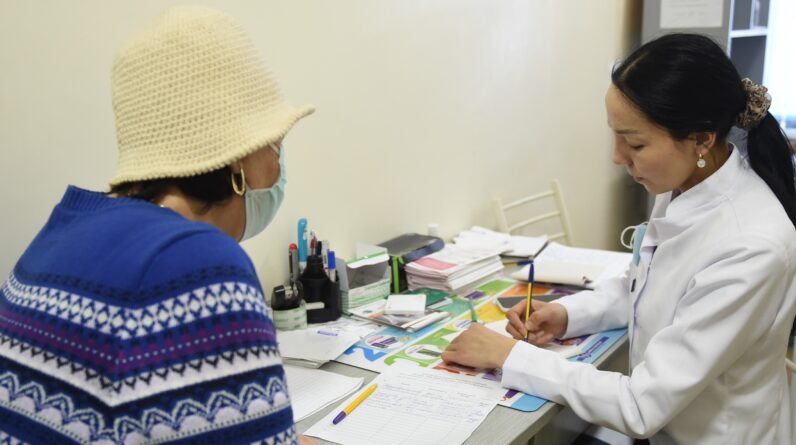
European Cervical Cancer Prevention Week aims to raise awareness about cervical cancer prevention. It is a designated week dedicated to educating individuals about the importance of early detection and vaccination against cervical cancer.
Cervical cancer is the fourth most common cancer in women worldwide and is preventable through regular cervical screening and the HPV vaccination. In Europe, several organizations and healthcare professionals collaborate to promote awareness and provide information about the disease. This dedicated week helps in highlighting the significance of screening programs and vaccination initiatives in reducing the burden of cervical cancer.
During European Cervical Cancer Prevention Week, various activities such as public campaigns, informational events, and educational seminars take place to encourage women to prioritize their cervical health. The ultimate goal is to empower women to make informed decisions regarding their health and take proactive measures to prevent cervical cancer.
The Importance Of Cervical Cancer Prevention
Cervical cancer is a serious health concern affecting women worldwide. It is the fourth most common cancer in women, with approximately 570,000 new cases reported globally each year. Understanding this disease and its impact on women’s health is crucial for effective prevention and early detection.
| Cervical cancer is primarily caused by the human papillomavirus (HPV). |
| It is estimated that 90% of cervical cancer deaths occur in low- and middle-income countries. |
| Regular screenings, such as Pap tests, can detect precancerous cells and effectively prevent the development of cervical cancer. |
| HPV vaccines are available to protect against the strains of the virus that are most commonly associated with cervical cancer. |
The role of early detection and prevention in reducing cervical cancer cases:
Early detection and prevention play a crucial role in reducing the burden of cervical cancer. Regular screenings can identify abnormal cell changes in the cervix, allowing for early intervention and treatment. The HPV vaccine provides an additional layer of protection by preventing initial infection with the virus. Empowering women through awareness and education is essential, as it encourages them to prioritize their health and take necessary steps towards prevention.
Promoting Screening And Vaccination Programs
Regular screenings and Pap tests play a crucial role in the prevention of cervical cancer. By detecting any abnormalities early on, these screenings can help in the timely treatment and management of the disease. However, it is important to note that screenings alone are not sufficient. HPV vaccination is equally important in preventing cervical cancer. The vaccine helps protect against high-risk types of the human papillomavirus (HPV), which is the leading cause of cervical cancer. It is essential to promote accessible and affordable screening and vaccination programs to increase participation rates among women. By addressing common misconceptions and concerns about screenings and vaccinations, such as safety and effectiveness, we can encourage more women to take advantage of these preventive measures. By raising awareness during the European Cervical Cancer Prevention Week, we can emphasize the importance of both screenings and vaccinations in the fight against cervical cancer.
Empowering Women Through Education And Support
European Cervical Cancer Prevention Week aims to empower women through education and support. Raising awareness about risk factors and symptoms of cervical cancer is crucial in early detection and prevention. Encouraging self-care and self-examination practices can help women identify any abnormalities in their bodies. Regular screenings and check-ups are essential for early diagnosis. Promoting healthy lifestyle choices such as maintaining a balanced diet, exercising regularly, and quitting smoking can greatly reduce the risk of cervical cancer. It is important to provide emotional support and resources for women affected by cervical cancer. Support groups, counseling services, and online forums can offer a safe space for them to share their experiences and find solace. By empowering women with knowledge and support, we can work together to prevent and combat cervical cancer.
Supporting Research And Innovation In Cervical Cancer Prevention
European Cervical Cancer Prevention Week is a crucial event that aims to create awareness about cervical cancer prevention and support innovative research in this field. The efforts to prevent cervical cancer have seen significant advancements in recent years.
Clinical trials and research studies have played a pivotal role in updating our knowledge and improving prevention strategies. These studies provide us with valuable insights into new approaches, technologies, and treatments. The results of ongoing trials help medical professionals make informed decisions and shape the future direction of cervical cancer prevention.
A key factor in the success of cervical cancer prevention is collaboration. Medical professionals, researchers, and organizations join forces to share knowledge and resources, accelerate progress, and bring innovative solutions to the forefront. Such collaborations foster a multidisciplinary approach, enabling a comprehensive understanding of the disease and its prevention.
The future holds exciting prospects and potential breakthroughs in cervical cancer prevention. Continued research and innovation have the potential to revolutionize prevention strategies, leading to improved early detection methods, more effective vaccines, and personalized approaches tailored to individual risks. This relentless pursuit of advancements will bring us closer to a world free from the burden of cervical cancer.
Spreading The Message: Advocacy And Public Awareness
Advocacy plays a crucial role in cervical cancer prevention and promoting women’s health. Engaging communities and stakeholders is key to raising awareness. By organizing campaigns and events, information about the importance of regular screenings, HPV vaccinations, and early detection can be shared. Social media and digital platforms provide a powerful tool for public outreach. Utilizing these platforms allows for wider dissemination of messages, reaching a larger audience. Collaborative efforts are of paramount importance in the global fight against cervical cancer. Various organizations, governments, and healthcare providers must come together to develop strategies, share knowledge, and implement prevention programs. By aligning efforts and resources, we can eliminate cervical cancer globally. With advocacy, community engagement, and digital outreach, we can effectively spread the message and empower women to prioritize their health.

Credit: www.euractiv.com
Frequently Asked Questions On European Cervical Cancer Prevention Week
What Is The Theme For Cervical Cancer Prevention Week 2023?
The theme for cervical cancer prevention week in 2023 has not been announced yet. Stay tuned for updates.
When Is Cancer Prevention Action Week In 2023?
Cancer Prevention Action Week in 2023 is held from a yet to be determined date.
When Is Cervical Cancer Awareness Month In Europe?
Cervical cancer awareness month in Europe is in January. Spread awareness and learn about prevention during this important month.
What Is The Theme For Cancer Awareness Month 2023?
The theme for Cancer Awareness Month 2023 has not been announced yet. Stay tuned for updates.
Conclusion
To wrap up, European Cervical Cancer Prevention Week plays a crucial role in raising awareness about the importance of preventive measures and early detection of cervical cancer. By encouraging women to undergo regular screenings and vaccinations, we can significantly reduce the incidence and mortality rates associated with this disease.
Together, let’s prioritize our health and strive for a cervical cancer-free future.



